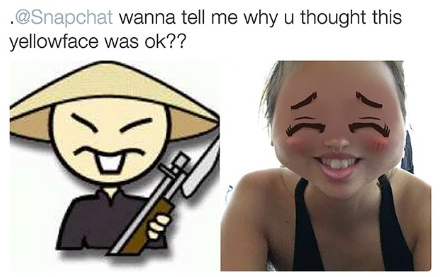Snapchat ‘yellowface’ filter removed after being accused of racism
The filter follows a problem with the ‘Weed Day’ filter that used a picture of Bob Marley and was accused of being a technological version of blackface

Your support helps us to tell the story
From reproductive rights to climate change to Big Tech, The Independent is on the ground when the story is developing. Whether it's investigating the financials of Elon Musk's pro-Trump PAC or producing our latest documentary, 'The A Word', which shines a light on the American women fighting for reproductive rights, we know how important it is to parse out the facts from the messaging.
At such a critical moment in US history, we need reporters on the ground. Your donation allows us to keep sending journalists to speak to both sides of the story.
The Independent is trusted by Americans across the entire political spectrum. And unlike many other quality news outlets, we choose not to lock Americans out of our reporting and analysis with paywalls. We believe quality journalism should be available to everyone, paid for by those who can afford it.
Your support makes all the difference.Snapchat has removed a filter that was said to be racist against East Asian people and said that it will never use it again.
The filter distorted people’s facial features so that they’re eyelashes looked wider and as if they were drawn as a cartoon. Snapchat has said that the filter was meant to be an homage to anime drawings – but others pointed out that it looked an awful lot like caricatures of East Asian people.
The filter was quickly removed from Snapchat. The company has said that she won’t be coming back into use.
It said that the lenses were intended to be “playful” and were never meant to offend anyone.
But deleting the filter wasn’t enough to satisfy some users, who said that they were going to stop using the app because of the filter. Some described Snapchat as having acted “like Trump” – “clearly racist and with the maturity of a third grader”.
The controversy follows an almost identical criticism of a “Weed Day” filter earlier this year, that turned people into a likeness of Bob Marley. That was given the go-ahead by Mr Marley’s estate but was criticised by many of its users, who said that it was a technological form of blackface.
And the app has come under fire for more subtle forms of racism too. For instance, many of the filters that it makes to “beautify” people’s faces also tend to lighten them or make them more white, critics have pointed out.
Join our commenting forum
Join thought-provoking conversations, follow other Independent readers and see their replies
Comments